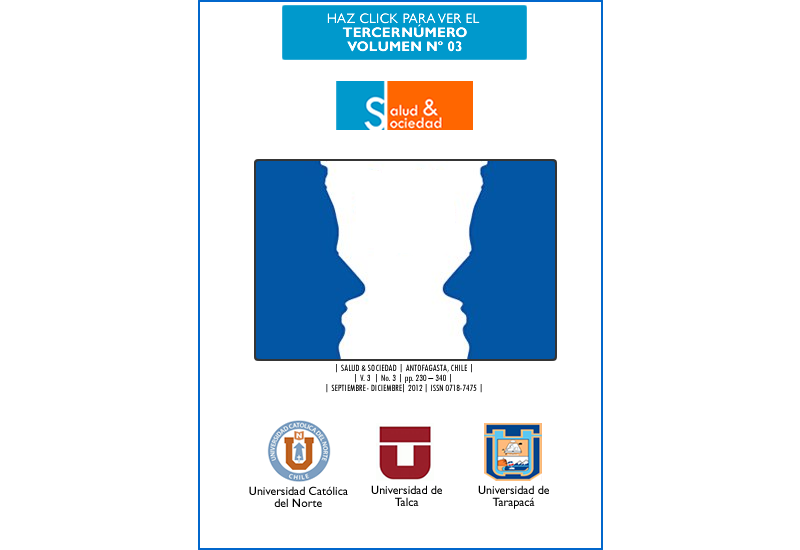Inteligencia emocional en la mejora de los estilos educativos de padres con hijos en edad escolar.
DOI:
https://doi.org/10.22199/S07187475.2012.0003.00004Palavras-chave:
Estilos parentales, inteligencia emocional, Parent styles, emotional intelligence,Resumo
Este trabajo, parte la hipótesis de que mejores niveles de inteligencia emocional, están asociados a mejores patrones de comunicación de tipo afectivo y a la adopción de un estilo parental eficiente. Se aplicó a una muestra de 468 padres de familia mexicanos, un cuestionario con preguntas de tipo sociodemográfico, el Trait Meta Mood Scale (TMMS-24) para evaluar la Inteligencia emocional percibida, la Escala de Normas y Exigencias (ENE-P) para identificar el estilo parental ejercido y la Escala de Afecto versión para padres (EA-P) que genera información sobre el tipo de comunicación que se establece entre padres e hijos. Los resultados muestran una sólida asociación entre las variables y una validez predictiva tanto de las habilidades emocionales como del tipo de comunicación en el ejercicio de un estilo parental inductivo.
This paper tries the hypothesis that higher levels of emotional intelligence are associated with better patterns of affective communication and the adoption of effective parenting styles. Participants were 468 Mexican parents who answered a demographic questionnaire, the Trait Meta Mood Scale (TMMS-24) to assess perceived emotional intelligence. The same participants also took the Scale of Standards and Requirements to identify the parental style and the Scale of Affection to assess the communication style established between parents and children. The results indicate a strong association between the variables and the predictive validity of both emotional skills and communication styles in the adoption of inductive parenting styles.
Downloads
Referências
Alegre, A., & Pérez N. (2009, September). Family, emotions, and preadolescents adaptation. Paper presented at the II International Congress on Emotional Intelligence), Santander, Spain.
Aunola, K. y Nurmi, J. (2005). The role of parenting styles in children´s problema behavior. Child Development, 76 (6), 1144-1159.
Baumrind, D. (1996). Effects of Authoritative Parental Control on Child Behavior. Child development, 37 (4) 887-907.
Cuervo, A. (2010). Pautas de crianza y desarrollo socio afectivo en la infancia. Diversitas: Perspectivas en Psicología, 6 (1), 111-121.
Denham, S. & Grout, L. (1992). Mothers’ emotional expressiveness and coping: Relations with preschoolers’ socialemotional competence. Genetic, Social, and General Psychology Monographs, 118 (1), 73-101.
Denham, S., Mitchell-Copeland, J., Strandberg, K., Auerbach, S., & Blair, K. (1997). Parental contributions to preschoolers’ emotional competence: Direct and indirect effects. Motivation and Emotion, 21 (1), 65-86.
Eisenberg, N., & Fabes, R. A. (1994). Mothers’ reactions to children’s negative emotions: Relations to children’s temperament and anger behavior. Merrill-Palmer Quarterly, 40, 138–156.
Fernández-Berrocal P., Extremera, N. y Ramos N. (2004). Validity and reliability of the Spanish Modified Version or the Trait Meta Mood Scale. Psychological Reports, 94, 751 – 755.
Florenzano, R., Valdés, M., Cáceres, E., Casassus, M., Sandoval, A., Santander, A. y Calderón, S. (2009). Percepción de la relación parental entre adolescentes mayores y menores de 15 años. Revista Chilena de Pediatría, 80 (6), 520-527.
Fuentes, M., Motrico, E., y Bersabé, R. (1999). Escala de Afecto (EA) y Escala de Normas y Exigencias (ENE): Versión hijos y Versión padres. Universidad de Málaga.
Fuentes, M., Motrico, E. y Bersabe, R. (2003). Estrategias de socialización de los padres y conflictos entre padres e hijos en la adolescencia. Anuario de Psicología 34 (3), 385-400.
Georgiou, S. (1999). Parental Attributions as predictors of involvement and influences on child achievement. British Journal of Educational Psychology. 69, 409-429.
González-DeHass, A, Willems, P. & Doan, M. (2005). Examining the relationship between parental involvement and student motivation. Educational Psychology Review. 17 (2), 99-123.
Gracia, E. y Lila, M. y Musito, G. (2005). Rechazo parental y ajuste psicológico y social de los hijos. Salud Mental, 28 (2), 73-81.
Gray, R. & Steinberg, L. (1999). Unpacking Authoritative parenting: Reassessing a Multidimensional Construct. Journal of Marriage and Family, 61 (3), 574-587.
Gottman, J., Katz, L. & Hooven, C. (1996). Parental meta-emotion philosophy and the emotional life of families: Theoretical models and preliminary data. Journal of Family Psychology, 10, 243–268.
Hoeve, M., Dubas, J., Gerris, J., Van Der, L., Smeenk, W. (2011). Maternal and parental parenting styles: unique and combined links to adolescent and early adult delinquency. Journal of adolescence, 34 (5), 813-827.
Jiménez, T., Musitu, G. y Murgui, S. (2008) Funcionamiento familiar y consumo de sustancias en adolescentes: el rol mediador de la autoestima. International Journal of clinical and health Psychology, 8 (1), 139-151.
Jones, S., Eisenberg, N., Fabes, R. & MacKinnon, D. (2002). Parents’ reactions to elementary school children’s negative emotions: Relations to social and emotional functioning at school. Merrill-Palmer Quarterly, 48, 133–159.
Katz, L. & Hunter, E. (2007). Maternal Meta-emotion Philosophy and adolescent, depressive symptomatology. Social Development, 16 (2), 343-360.
Martinez-Pons, M. (1999). Parental Inducement of emotional intelligence. Imagination, cognition and personality, 18 (1), 3-23.
Mayer, J., y Salovey, P. (1997). What is emotional intelligence? En Salovey, P. y Sluyter, D. (Eds), Emotional Development and Emotional Intelligence: Implications for Educators (pp. 3-31). Nueva York: Basic Books.
McDowell, D., Parker, R. & Wang, S. (2003). Differences between mothers and fathers advice-giving style and content: Relations with social competence and psychological functioning in middle childhood. Merrill-Palmer Quarterly, 49 (1), 55-76.
Mestre, M., Samper, Tur, A. y Diez, I. (2001), Estilos de crianza y desarrollo prosocial de los hijos. Revista de psicología General y aplicada, 54 (4), 691-703.
Mestre, M., Tur, A., Samper, P., Nacher, J. y Cortes, M. T. (2007). Estilos de crianza en la adolescencia y su relación con el comportamiento prosocial. Revista Latinoamericana de Psicología, 39 (2), 211-225.
Morris, A., Silk, J., Stenberg, L., Myers, S. & Robinson, L. (2007). The Role of the family context in the development of emotion regulation. Social Develoment, 16 (2), 362-388.
Newcomb, K., Mineka, S., Zimbarg, R. & Griffinth, J. (2007). Perceived Family Environment and symptoms of emotional disorders: The Role of perceived control, Attributional style, and attachment. Cognitive Therapy and Research, 31, 419-436.
Palacios, J. y Andrade, P. (2008). Influencia de las prácticas parentales en más conductas problema en adolescentes. Investigación Universitaria Multidisciplinaria, 7 (7), 7-18.
Palomera, R. (2009). El posible papel del contexto familiar en el desarrollo de la inteligencia emocional. En FernándezBerrocal, P., Extremera, N., Palomera, R., Ruiz-Aranda, D., Salguero, J. y Cabello, R. (Coords) Avances en el Estudio de la Inteligencia Emocional. Santander: Fundación Marcelino Botín.
Páez, D., Fernández, I., Campos, M., Zubieta, E. y Casullo, M. (2006). Apego seguro, vínculos parentales, clima familiar e inteligencia emocional: Socialización, regulación y Bienestar. Ansiedad y Estrés, 12 (2-3), 328-341.
Pons, J., Berjano, E. y Garcia, F. (1996). Variables psicosociales que discriminan el consume abuso de alcohol en la adolescencia. Adicciones, 8 (2), 177-191.
Quiróz, N., Villatoro, J., Juárez, F., Gutiérrez, M., Amador, N., y Medina Mora, M., (2007). La familia y el maltrato como factores de riesgo de conducta antisocial. Salud Mental, 30 (4), 47-54.
Ramírez, M. (2002). Prácticas de crianza de riesgo y problemas de conducta en los hijos. Apuntes de Psicología, 20 (2) 273-282.
Ramírez, M. (2007). Los padres y los hijos: Variables de riesgo. Educación y Educadores, 10 (1), 27-37.
Salovey, P., Mayer, J., Goldman, S., Turvey, C., y Palfai, T. (1995). Emotional attention, clarity, and repair: Exploring emotional intelligence using the Trait Meta-Mood Scale. En Pennebaker, J. (Ed.), Emotion, Disclosure and Health. Washington: American Psychological Association.
Solís, P. & Díaz, M. (2007), Relaciones entre creencias y prácticas de crianza de padres con niños pequeños. Anales de Psicología, 23 (2), 177-184.
Solís, P., Díaz, M., Medina, Y. y Barranco, L. (2008). Valoración objetiva del estilo de crianza y las expectativas de parejas con niños pequeños. Revista Latinoamericana de Psicología, 40 (2), 305-319.
Spera, C. (2005). A review of the relationship among parenting practices, parenting style, and adolescent school achievement. Educational psychology y review, 17 (2), 125- 146.
Urzua, A., Godoy, J. y Ocayo, K. (2011). Competencias parentales percibidas y Calidad de Vida. Revista Chilena de Pediatría, 82 (4), 300-310.
Vallejo, A. Osorno, R. y Mazadiego, T. (2008). Estilos parentales y sintomatología depresiva en una muestra de adolescentes veracruzanos. Enseñanza e Investigación psicológica, 13 (1), 91-105.
Zukauskiené, Malinauskiené & Erentaité (2011) Effects of parenting styles and emotional intelligence on self-efficacy and self-esteem in late adolescence: gender differences. Psichologija, Journal of Vilnus University, 44, 22-41.
Downloads
Publicado
Edição
Seção
Licença
Los autores continúan como propietarios de sus trabajos, y pueden volver a publicar sus artículos en otro medio sin tener que solicitar autorización, siempre y cuando indiquen que el trabajo fue publicado originariamente en Revista Salud & Sociedad (ISSNe:0718-7475).



_(1).png)





